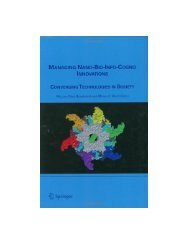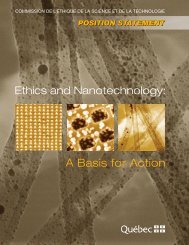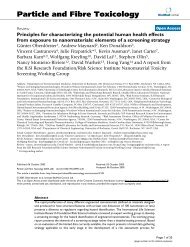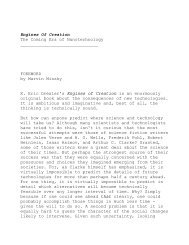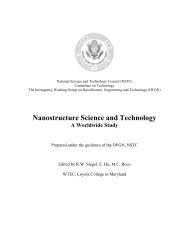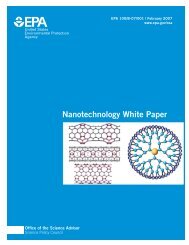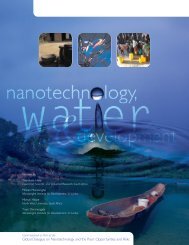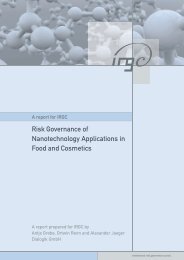Download - Nanowerk
Download - Nanowerk
Download - Nanowerk
Create successful ePaper yourself
Turn your PDF publications into a flip-book with our unique Google optimized e-Paper software.
… and there are no less intrusive methods.” Surveillance applications must be specified in<br />
legislation and monitored by an independent court (European Group on Ethics, 2005).<br />
The checklist of ethical issues for FP6 proposals is mainly focused on biomedical research.<br />
However, informed consent in case the project involves human data collection is also<br />
relevant to some nanotechnology based security technologies. Other relevant aspects are<br />
privacy issues, both processing of genetic information or personal data, and tracking the<br />
location or observation of people. Research involving developing countries (use of local<br />
resources or benefit to local community) and dual use aspects (research having potential<br />
military or terrorist applications) are also relevant to some nanotechnology based<br />
security technologies (Cordis FP7 webpages, 2007).<br />
5.2.2 Other international declarations<br />
The Declaration of Principles of the World Summit on the Information Society (WSIS) of<br />
12 December 2003 includes four articles on ethical aspects. Articles 56 and 57 address<br />
fundamental values and ethics for the Information Society as a whole. Article 58 states:<br />
“The use of ICTs and content creation should respect human rights and fundamental<br />
freedoms of others, including personal privacy, and the right to freedom of thought,<br />
conscience and religion in conformity with relevant international instruments.” Article 59<br />
states: “All actors in the Information Society should take appropriate actions and<br />
preventive measures, as determined by law, against abusive uses of ICTs, such as illegal<br />
and other acts motivated by racism, racial discrimination, xenophobia, and related<br />
intolerance, hatred, violence, all forms of child abuse, including paedophilia and child<br />
pornography, and trafficking in, and exploitation of, human beings.” (WSIS, 2003).<br />
The Organisation for Economic Co-operation and Development (OECD) has adopted<br />
guidelines on the protection of privacy and trans-border flow of personal data, which<br />
forms the framework for harmonising national and EU legislation (OECD, 1980). This was<br />
followed by a “Ministerial Declaration on the Protection of Privacy”, at a conference in<br />
Ottawa, Canada, 7-9 October 1998 (OECD, 1998). An OECD Working Party on<br />
Information Security and Privacy (WPISP) monitors trends and discusses policy options.<br />
The Council of Europe also lays down rules for personal data protection in the<br />
“Convention for the Protection of Individuals with regard to Automatic Processing of<br />
Personal Data of the Council of Europe of 1 January 1981.” (Council of Europe, 1981).<br />
The main issue in the global discussion on privacy and data protection is related to<br />
differences in legislation between the USA and Europe, e.g. concerning personal data of<br />
airline passengers. This is not related to any particular technology, but an element of the<br />
legal and ethical framework in which some nanotechnology based identification and<br />
tracking devices are being developed. In the present globalising information society, the<br />
EU is not free to determine its own legislation independently of other countries.<br />
5.2.3 Conclusions on regulatory and ethical framework<br />
The main established legal and ethical requirements which impose boundaries on the<br />
development of nanotechnology based security technologies are summarised below:<br />
• For active nanodevices implanted in the human body or which can wirelessly<br />
connect to the human brain or nervous system, or enable others to view the<br />
naked body of a person; the right to physical and mental integrity and prohibition<br />
of degrading or inhuman treatment are valid. These are apparently not relevant to<br />
other applications of nanotechnology for security.<br />
• RFID chips and other nanoelectronics and sensor based technologies which can be<br />
used to collect personal and group data for storing in databases, are covered by<br />
legislation and ethical guidelines for protection of private and family life, home<br />
and communications; personal data protection; and equality and nondiscrimination.<br />
49




